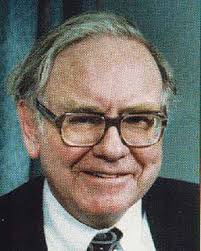Benjamin Graham’s Investment Principles
Legendary Wall Street analysist, Benjamin Graham sums up his investment philosophy by saying that an intelligent investor must be "businesslike" in approach. Investing in shares in a company is just like owning a share in a business enterprise and the investment must be approached as if one were buying a business, or a partnership in one.
Warren Buffett has attributed much of his success to the investment philosophy of Benjamin Graham
There are four guiding principles for Graham:
1. Know the businessThe investor needs to become knowledgeable about the business or businesses carried on by the company in which they propose to invest – what it sells, how it operates, what is the competitive environment, what are the threats and opportunities, the strengths and weaknesses.
An investor who bought a fruit shop, or a shoe factory, without investigating these things, and knowing them, would be foolish. The same applies to share investment. An investor who does not understand the business should not be investing in it.
2. Know who runs the business
An investor who cannot operate the business for himself or herself, needs a manager. This is the position of the average share investor, who owns a share of an enterprise that is run by others.
The owner of a business in this position would want a manager who will manage the business competently, efficiently and honestly. The share investor should not be satisfied with less. Unless the investor believes, through sound research, that the company is managed efficiently, competently and honestly, in the best interests of the shareholders, the investment should not be made.
3. Invest for profits
An investor would not normally buy a business that did not, on proper research, appear to have reasonable expectations of producing good profits over time. Share investors should take the same approach and buy, as Graham says, "not on optimism, but on arithmetic".
4. Have confidence
Graham encourages investors to properly research their investments and, if they believe their investment judgment to be sound, to act on it. He cautions investors in this position against listening to others.
"You are neither right nor wrong because the crowd disagrees with you. You are right [or wrong] because your data and reasoning are right [or wrong]."
 In 1949, Graham wrote the Intelligent Investor, considered the Bible of value investing.
In 1949, Graham wrote the Intelligent Investor, considered the Bible of value investing. 
